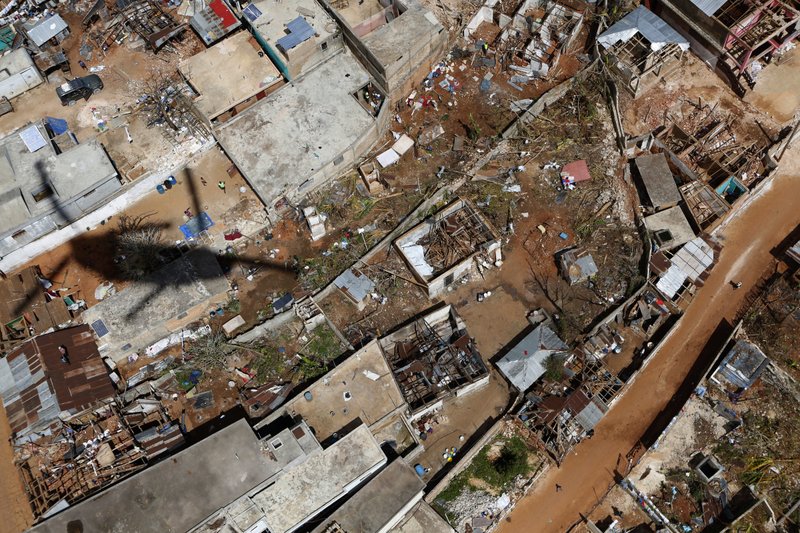PORT-AU-PRINCE, Haiti -- An international relief effort for victims of Hurricane Matthew entered a more advanced stage Thursday as a second U.S. military ship arrived off Haiti's coast.
RELATED ARTICLE
http://www.arkansas…">Historic N.C. town inundated in Matthew's wake
Across the hard-hit southwestern peninsula, United Nations convoys and nongovernmental organizations began reaching more isolated communities. Food, clean water and construction materials have begun pouring in, though many people there still say they've seen little or no aid.
Those working to send everything from water-purification systems to building materials say the scope of the damage from Matthew and the difficulty reaching people create logistical challenges similar to those faced after the devastating earthquake that struck the crowded capital and surrounding areas in January 2010. But while the death toll from last week's storm is in the hundreds, the Haitian government has said the earthquake killed more than 300,000.
"There's just so much to do, not to make it more than the earthquake, but it's so widespread, it's everything across the board," said Chris Bessey, the country representative for Catholic Relief Services.
The Haitian government says more than 1.4 million people urgently need humanitarian assistance. The official death toll is 473, though area officials have reported figures suggesting it will eventually be higher, and the homes of more than 120,000 families were damaged or destroyed. Many people across the ruggedly scenic peninsula have watched passing aid trucks in growing frustration.
"I'm looking at my life and I don't know what to do. It seems like somebody is getting help but it is not us," said Watson Hypolite, a 66-year-old in the badly hit Grande Anse district of Beaumont as trucks with the logos of the U.N. and International Organization for Migration, guarded by peacekeepers, passed him on a mountainous gravel road.
But in the challenges, the relief effort has risen visibly in recent days. Teams from the Haitian Red Cross and Civil Protection agency have fanned out across the peninsula, and large convoys from the U.N. and the migration agency are seen more throughout the disaster zone. On Wednesday, the U.S. military made 13 helicopter flights to hard-to-reach areas with 159 tons of food supplies, the U.S. Agency for International Development said.
On Thursday, the agency announced more than $12 million in additional humanitarian assistance to aid hurricane-stricken communities. David Harden, its head of humanitarian assistance, said the package of short-term relief for Haiti includes $7 million for food and $3 million for emergency relief supplies. The agency also will ship in 38 tons of chlorine to help provide clean water, which is critical to fight a spike of cholera.
Harden said the U.S. also is looking into long-term assistance in coordination with the Haitian government and other partners but the details have yet to be determined.
"We are good neighbors and we are good partners, and I would expect that we would expect to be there in the medium and long term," he said.
Harden said the Hurricane Matthew relief effort was akin to the situation faced during other major disasters such as the Nepal earthquake in April 2015 or the Philippines typhoon in November 2013, both of which also had much higher death tolls.
"What complicates it is logistics, remote areas, hard-hit areas, and a lack of capacity," Harden said. "These are poor countries, that's why it's tougher there than in Miami."
The amphibious assault ship USS Iwo Jima arrived off the coast of the widely affected city of Jeremie to serve as a mobile helicopter base and logistics hub to take supplies and construction assistance to the southwestern peninsula. It will relieve the USS Mesa Verde, which arrived shortly after the storm started hitting the peninsula Oct. 3 and 4.
Along with widespread hunger and the loss of crops, livestock and fishing boats and gear, authorities warn that cholera appears to be rising, making delivery of water-purification supplies a high priority as officials consider how to help the region over the longer term.
"Hurricane Matthew hit us strongly, but we'll pick ourselves up," said Interior Minister Francois Anick Joseph, who stressed that the priority for Haiti and its various international and local partners was to meet the urgent needs for food, water, and medical supplies for people in affected areas.
Information for this article was contributed by David McFadden of The Associated Press.
A Section on 10/14/2016

